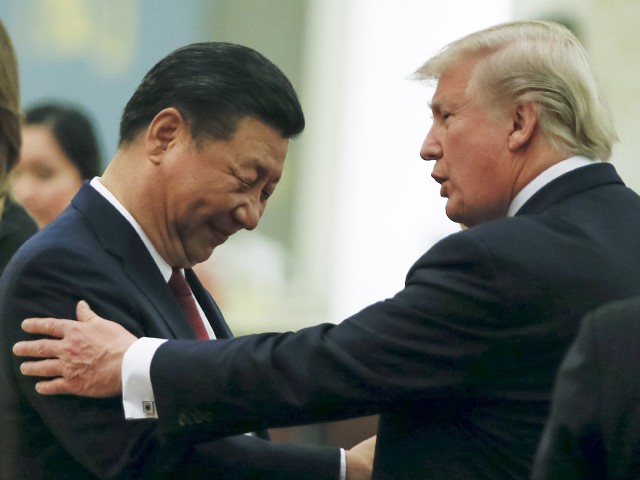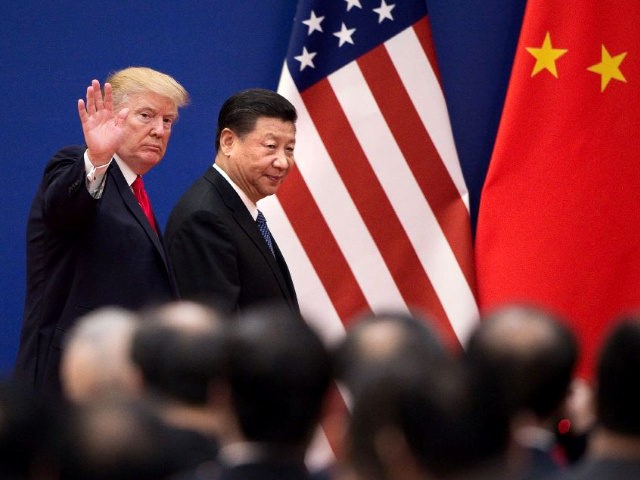Chinese Foreign Minister Wang Yi last week broke the uneasy silence among China’s leadership and offered public comments on the upcoming American election, which stands a good chance of returning outspoken China critic Donald Trump to the White House.
In the midst of a long discourse with Al Jazeera News on the state of U.S.-China relations last Thursday, Wang hilariously insisted China “never interferes in the internal affairs of other countries” and would not meddle in the 2024 presidential election.
“Meddling with others is not the Chinese way,” Wang insisted. His declaration would come as surprising news to the vast legion of hackers and propagandists Wang’s government pays to influence elections around the world, from the United States and Canada to the United Kingdom and Taiwan.

File/U.S. President Donald Trump (R) welcomes Chinese President Xi Jinping (L) to the Mar-a-Lago estate in West Palm Beach, Florida, on April 6, 2017. (JIM WATSON/AFP via Getty)
“Whoever is elected, Chinese and American peoples will still need to have exchanges and cooperation, and the two major countries must find the right way to get along with each other,” Wang said.
Wang portrayed Chinese dictator Xi Jinping as the wise mentor who sought to guide President Joe Biden back to the path to harmony and said Xi would stick to the same “principles” if Trump becomes president again:
The three principles – mutual respect, peaceful coexistence, and win-win cooperation – put forward by President Xi Jinping are our fundamental guidance and goal when viewing and handling China-US relations. During his recent phone call with President Biden, President Xi pointed out once again that two big countries like China and the United States should not cut off exchanges or turn their back on each other, still less slide into conflict or confrontation. They should instead cherish peace, value stability, and uphold credibility.
The China-US relationship cannot go back to its past. But it should, and can fully, have a bright future. China is ready to work with the United States to carry out more win-win cooperation, do more that benefits the whole world, and truly fulfill their respective responsibilities to the international community.
Wang included some of the Chinese Communist Party’s boilerplate carping that the Biden administration roiled U.S.-China relations much more than necessary by clinging to its “misperception of China” and its “misguided policy to contain China,” by which he meant rallying a regional coalition to resist Beijing’s territorial aggression in the South China Sea, taking action against Chinese technology theft, standing up for Taiwan’s independence, and “ratcheting up its unilateral sanctions.”
“The United States should not view the world through the lens of Cold War and zero-sum mentality, and it should not say one thing but do another. The people of the world have clear eyes, and even more so for the Middle East people that can see easily who is on the right side of history and justice,” Wang said.

File/China’s President Xi Jinping and China’s first lady Peng Liyuan and U.S. President Donald Trump and first lady Melania attend a state dinner at the Great Hall of the People on November 9, 2017 in Beijing, China. Trump is on a 10-day trip to Asia. (Thomas Peter – Pool/Getty Images)
This was code for China’s decision to burn its relationship with Israel and go all-in on supporting Palestinian terrorism, including the horrific atrocities of October 7, which the Chinese Communist regime steadfastly refuses to condemn. China has been cynically using the war started by Hamas to build its influence in the Middle East, probably calculating that the huge volume of Israel’s trade with China will keep the Israelis from complaining too loudly.
The South China Morning Post (SCMP) on Tuesday took Wang’s remarks to Al Jazeera as evidence the Chinese Communist Party is bracing for the very real possibility that Trump will win the 2024 election and might see that eventuality as an “opportunity,” because supposedly Biden’s policies have been more of a headache for Beijing that anything the tough-talking Trump actually did in office:
While Trump appeared to be tough on Beijing, and even instilled fear in China with his big tariff stick and flip-flops on Taiwan – as leading US specialist Shi Yinhong put it, Beijing turned out to be a benefactor of Trump’s self-alienating “America first” policy.
Many believe that if he won in November, Trump would likely carry on where he left off four years ago, undermining US alliances, weakening its global position and accelerating Washington’s relative decline – exactly what Beijing, Moscow and their autocratic friends hope for.
Some observers have suggested that Beijing may be looking at playing the long game with Washington, assuming a Trump election victory over Biden would see the US dial back support for Taiwan.
These assertions are a pudding whipped up from a batch of conventional-wisdom assertions about foreign policy that have not been faring well in the face of Biden’s actual presidency.
On the chalkboard of a faculty lounge, Trump’s insistence on matters such as NATO members paying their dues and his undisciplined approach to diplomacy should have driven U.S. allies away and created opportunities for hostile nations, while Biden’s long pedigree of conventional politics and close relationship with the permanent bureaucracy – both in America’s vast government and in the halls of the United Nations – should have brought the West and Pacific Rim together in a rock-solid alliance that would make malefactors like China, Russia, and Iran think twice about causing trouble.
What actually happened in the real world is that Trump presided over four years of relative harmony, and then the world exploded into fire and blood as soon as Joe Biden took office. The axis of tyranny was emboldened to pull the trigger on nightmare scenarios like Russia’s invasion of Ukraine, repression increased everywhere authoritarians hold power, human rights deteriorated, and every thug regime on Earth took turns slapping Biden around after his disastrous withdrawal from Afghanistan.
Biden’s frantic need to shore up the pro-terrorist wing of the Democrat Party has brought him to the edge of wrecking America’s relationship with Israel; perhaps only the heavy-handed ineptitude of the Biden administration prevented Israeli Prime Minister Benjamin Netanyahu from being ousted in a “color revolution” cooked up by the White House. The Biden State Department appears to be in a perpetual state of shock that nothing works the way university professors and network anchors told them it would.
China’s biggest problem with Joe Biden is that his administration went so all-in against Russia over the Ukraine invasion. The Biden administration grumbles about Chinese export dumps, but it has taken few concrete actions as of yet, allowing Beijing to breezily dismiss comments from the likes of Treasury Secretary Janet Yellen as meaningless theatrics. The big sticking point right now is that Biden’s team is embarrassing China by telling it not to support the Russian war machine.
“I made clear that if China does not address this problem, we will,” the SCMP quoted Secretary of State Antony Blinken saying after a meeting with Chinese dictator Xi Jinping. It remains to be seen exactly what Blinken and Biden are prepared to do, but given the perilous state of the U.S. economy and Biden’s dismal poll numbers, it seems very unlikely they would initiate a confrontation that might seriously damage the U.S. economy.
Trump might not want to do that either, so China’s leaders might calculate that Trump’s return would bring more changes in rhetoric than policy. The real nightmare scenario for Beijing would be Trump taking dramatic action to jump-start the U.S. economy and slash government spending to reduce the debt, and even if he decided to take such actions, it remains to be seen if his own party would fully support him.

COMMENTS
Please let us know if you're having issues with commenting.